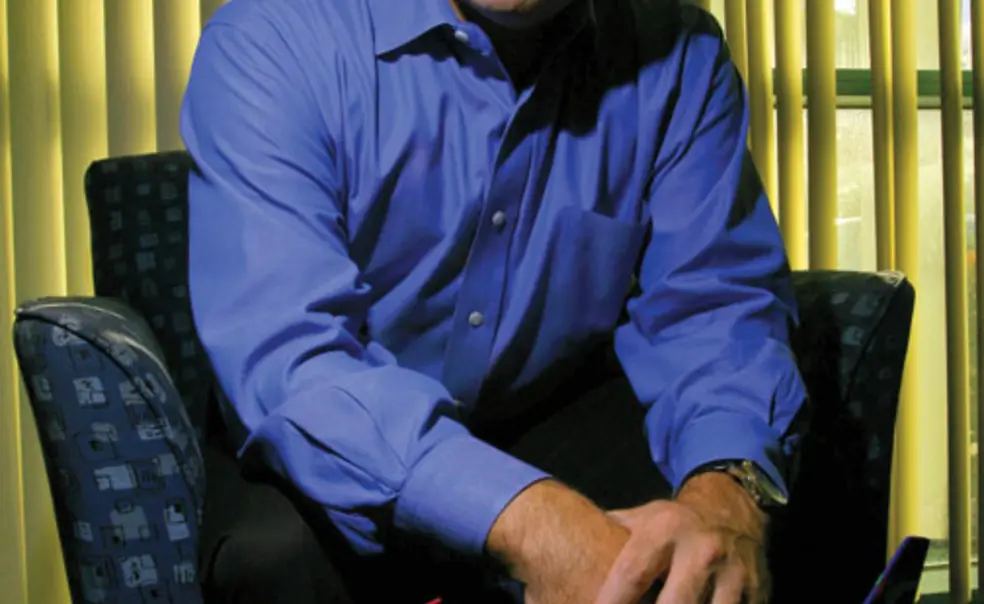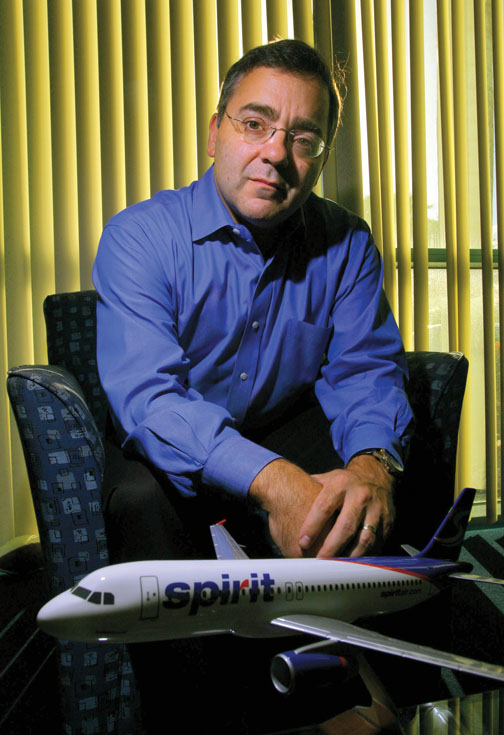A moment with ... Ben Baldanza *86, on airline economics
Since taking over as CEO of no-frills Spirit Airlines in May 2006, Ben Baldanza *86 has used low fares and offbeat ads to lead his company to post profits at a time most airlines were hemorrhaging money. On Spirit, Baldanza says proudly, there’s no free food or drink, no business class, and not a lot of legroom. Before the summer travel season got under way, Baldanza spoke to PAW about his industry — and about why he made Spirit the first airline to charge for carry-on bags.
This interview was conducted and prepared for publication before Spirit pilots went on strike against the company because they had been working without a contract. On June 16, as PAW was going to press, the pilots and Spirit Airlines reached a tentative settlement.
How has Spirit been able to make a profit in this tough business climate?
We operate a very different business model than most airlines. If I can use a retail analogy, most big airlines — Delta, American, United — think of themselves as like a Nordstrom: They have a premium product and charge a reasonable rate for it, especially to the type of customer who has somebody else buying the ticket. Low-cost carriers in the U.S. — like JetBlue or Southwest or AirTran — are more like a Target: You save money, but you still feel good about shopping there. We’re more like Costco. With Costco, you don’t even get shopping bags. You shop in a warehouse that’s got pipes running everywhere. But if you want the lowest price on paper towels and big bulk items, that’s where you go. And that’s kind of who we are. Our price is our product.
Most airlines bundle their services and include them as part of the ticket price. They charge a higher fare, but they include a lot of the product features. We unbundled, very aggressively. We’re selling about $30 per customer in something other than the ticket price. So when someone buys a $29 ticket, on average we’re collecting about $59, because they’re choosing to check some bags or buying travel insurance or something to eat or drink. The beauty is that the customer decides whether to pay that or not.
You present these charges — such as the charge for carry-on bags, starting Aug. 1 — as a way to lower fares.
Charging for carry-on bags was a logical extension for us, and it’s not all altruistic. We estimate carry-ons were costing us five to seven minutes per turn — when a plane comes to a gate, people get off, people get on, and the plane leaves again. That’s because in many cases, the bags won’t all fit on the plane, and we have to take the bags from passengers in the jetway and check them. If you take our little airline and take even just five minutes, times six trips per day, times 30 airplanes, you get 900 minutes a day. That’s 15 hours a day I can’t fly the plane! The fact that we can fly 15 more hours per day — that’s essentially like bringing out a brand-new airplane. That’s the motivation for the carry-on fee: to stop the delays related to the carry-on bag.
What else might Spirit charge for?
We tend to look at things that affect the most customers. For example, we don’t sell hot meals aboard the airplane — when we look at the cost of adding hot meals and the number of people who would buy them, it’s just not that exciting a prospect. But with something like the bag fee, about 70 percent of the people carry on a bag, so you can make a big deal about that. We’re looking for things that allow us to really take the fare down in jumps, like 20 bucks.
I read that you have a collection of 1,700 board games.
The number moves up and down, but that’s about right. When I was growing up, my family played games after dinner. That’s my overwhelming memory of growing up, playing mostly Italian card games with my mother and father in Rome, N.Y. Now, my wife and I find it’s a nice alternative to renting a movie and having four people just sitting around staring at a screen.
Are there any games that involve air travel?
You know, for a while, I collected those. There was a time in my life when I told myself I wanted to own every board game that was ever invented about air travel. Most of them were bad games.
— Interview conducted and condensed by Merrell Noden ’78











No responses yet